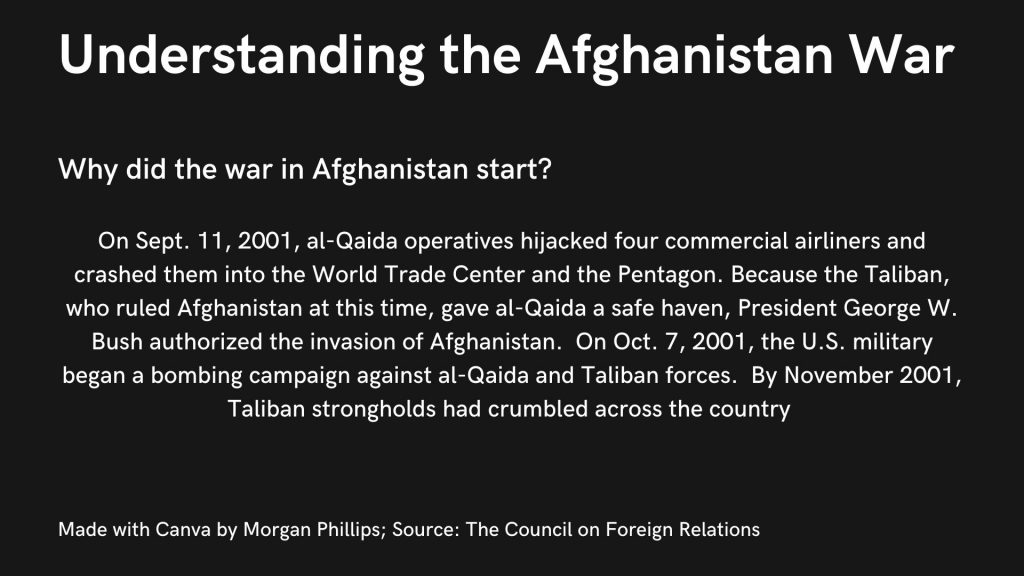Car bombs. Air strikes. Burning flesh. Mangled bodies. The pop of an enemy’s weapon. Rubble clinging to the streets. The city wearing the smell of death like musty perfume.
“I really don’t know how to describe it,” Shane Kozusko, an Afghanistan War veteran in Athens, said. “I mean, it’s just war.”
On Aug. 30, the United States withdrew from Afghanistan, ending a 20 year long war. The execution of the withdrawal prompted several foreign policy organizations to compare it to the U.S. withdrawal from Vietnam on April 30, 1975.
For local Vietnam veterans, the scenes from Afghanistan were familiar. For local Afghanistan veterans, the withdrawal was difficult, but for both veterans, war was hell and so was the withdrawal.
Why It’s Newsworthy: When a government starts a war, it comes with a cost that is inflicted on the troops in a war zone, and when that government decides to withdraw from the war, it weighs heavily on its veterans too. If a society is to understand war and withdrawal, it must listen to the veterans who lived it, breathed it and survived it.
A War of Politics
For local Vietnam veterans, the Vietnam War reeked of politics.
“It was messed up from the get go. The [politicians] didn’t know what they were getting into when they first went in there, and it just kept getting worse,” Dick Field, a Vietnam veteran in Athens, said. “The politicians and the military — they’ve just got this game that they’re trying to play.”
Tim Furlow, a Vietnam veteran in Athens, said politics was the reason he got sent to war in the first place.
“[Soldiers] are the victims of some politician’s decision,” Furlow said.
Local Afghanistan veterans struck a similar tone.
Casey Geist, an Afghanistan veteran and doctoral student at the University of Georgia, said politics were at the center of the withdrawal.
“What was a little frustrating to me was the State Department and Department of Defense’s inability to communicate with each other to effectively plan and execute a withdrawal,” Geist said. “It just shows that when politics gets involved in something that should be deliberately planned, it can definitely mess things up. And I think it was messed up.”
To be or not to be Forgotten
President Biden announced there would be a full troop withdrawal from Afghanistan by Sept. 11, 2021, and it was the Sept. 11 anniversary that made Geist feel that Afghanistan veterans had been forgotten.
“Afghanistan started from 9/11 … [and] during the 20th anniversary, everyone was like ‘never forget.’ Well, you did forget. I was over there with all my friends and we were getting killed, and when I turned the news on, they were more concerned about the Kardashians,” Geist said. “You forgot and you left us there for 20 years — getting killed, getting our limbs blown off, losing our friends.”
Field said Vietnam soldiers had the opposite problem. They weren’t forgotten but were always on the public’s mind.
“That was the major difference [between Afghanistan and Vietnam] because the draft was still in place. All males could potentially be drafted and sent to Vietnam, so the whole country was up in arms about it, and that never stopped,” Field said. “We didn’t have the draft going on during Afghanistan, and so yes, people forgot about it.”
For Furlow, it wasn’t about being forgotten but about fighting an unpopular war.
“It was less of being forgotten and more of — the public hated us for being over there,” Furlow said.
Reflecting on their Service
After U.S. troops began withdrawing from Afghanistan, it took the Taliban two weeks to regain control over the country. The first enemy the U.S. toppled during the War in Afghanistan was right back where it started.
That realization caused James Creager, an Afghanistan veteran from Hull, to question the war.
“It just made you wonder, what did we do it all for? We did a good job of getting them cleaned out and now they let them come back in,” Creager said.
The North Vietnamese, the enemy of the U.S. in the Vietnam War, also regained control after U.S. troops pulled out.
“We pulled out. The North Vietnamese Army came in and took over that area, so we fought for five years — all the casualties, all the money spent — and for what? I don’t know,” John Flock, a Vietnam veteran in Athens, said.
The Execution of the Withdrawal
The execution of the withdrawals from Vietnam and Afghanistan felt like a bad ending for these local veterans.
For Creager, the execution of the Afghanistan withdrawal showed him that the government did not put thought into it.
“You had a way to do it properly, and just because you didn’t agree with what was set in place by the last administration is no reason that you sacrifice soldiers and the people who have helped you,” Creager said.
Vietnam veterans said the Afghanistan withdrawal was like watching their own withdrawal on TV all over again.
“I don’t see any difference between us pulling out of Vietnam at the last minute and Afghanistan … It’s the same scenario. I can’t believe that we weren’t smart enough to understand what went on in Vietnam,” Flock said. “They say, if you study history, that it repeats itself. Well, it repeated itself.”
Feelings of Failure
For Field, Flock and Furlow, the Vietnam War was a failure.
“Even when I was there, I questioned if we were doing any good. There were times when you would help … but by and large you just couldn’t see that you were making much progress,” Field said.
For Creager, Geist and Kozusko, the Afghanistan War wasn’t a complete success nor a complete failure.
Geist said the failure lay in giving troops an impossible task — taking away safe havens for terrorists in a country so large that they can hide anywhere.
“It was like we were trying to stop the Titanic from flooding with two tea cups and just spooning them over the side,” Geist said.
For Kozusko, the failure lay with the U.S. government.
“It was a colossal failure by the U.S. government,” Kozusko said. “We did what we could do on the lower rungs of the ladder, and this was just a failure by the top … I did what I was supposed to do for my years there.”
Denouement
Less than 10% of the U.S. adult population are veterans, according to the Pew Research Center. That means that less than 10% of the American adult population have experienced war or have lived with the costs of it.
These local veterans know the cost of war and withdrawal well. It’s in their faces, their words and their memories. The repercussions of war are attached to them like an extra appendage.
It was war that brought them here.
Morgan Phillips is a senior majoring in anthropology and journalism in the Grady College of Journalism and Mass Communication at the University of Georgia.











Show Comments (0)